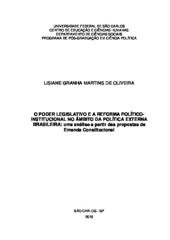| dc.contributor.author | Oliveira, Lisiane Granha Martins de | |
| dc.date.accessioned | 2019-02-18T17:08:06Z | |
| dc.date.available | 2019-02-18T17:08:06Z | |
| dc.date.issued | 2018-10-29 | |
| dc.identifier.citation | OLIVEIRA, Lisiane Granha Martins de. O poder legislativo e a reforma político-institucional no âmbito da política externa brasileira: uma análise a partir das propostas de Emenda Constitucional. 2018. Dissertação (Mestrado em Ciência Política) – Universidade Federal de São Carlos, São Carlos, 2018. Disponível em: https://repositorio.ufscar.br/handle/ufscar/10983. | * |
| dc.identifier.uri | https://repositorio.ufscar.br/handle/ufscar/10983 | |
| dc.description.abstract | Since the Brazilian Constitution of 1824 the conduct of foreign policy has been of considerable concentration in the Executive Branch, having the Legislative Branch a post factum role in its decision making process. This institutional model was not altered by the Federal Constitution of 1988, which established the exclusive competence of the President of the Republic to conclude treaties, conventions and other international acts subject to a referendum of the National Congress when they incur burdensome charges or commitments to national patrimony. In this context, part of the national literature has brought to the discussion the role of the Legislative in the conduct of external relations, debating its role as a mere locus homologous to the decisions coming from the Executive. Likewise, since the late 1990s, there has been a growing movement for the presentation of proposals for amendments to the Constitution (PEC’s) by parliamentarians in order to promote a political-institutional reform in the distribution of competences in the scope of foreign policy. In this way, the objective of this paper is to answer the following question: what is the potential veto point in the decision making process of these PECs, considering that, to date, none of the measures presented has achieved its objective. And in this sense, one will try to understand when, under what conditions and for what reasons, this Power chooses to formally propose the alteration of the rules of the political game in this scope. Thus, it is based on the hypothesis that the Constitution and Justice Commission of the Legislative Houses of the National Congress is a potential veto point for the measures that are the object of this research, acting more for the non-inclusion of these proposals for voting in plenary of that Committee, than for its express rejection in the opinions issued. Methodologically, the bibliographical and documentary research will be used with a qualitative study and analysis of data content regarding these proposed Constitutional Amendments presented at both Houses of the National Congress in the post-enactment period of CF/88 until 2015. | eng |
| dc.description.sponsorship | Não recebi financiamento | por |
| dc.language.iso | por | por |
| dc.publisher | Universidade Federal de São Carlos | por |
| dc.rights.uri | Acesso aberto | por |
| dc.subject | Política externa | por |
| dc.subject | Poder Executivo | por |
| dc.subject | Poder Legislativo | por |
| dc.subject | Propostas de Emendas Constitucionais | por |
| dc.subject | Foreign policy | eng |
| dc.subject | Executive Branch | eng |
| dc.subject | Legislative Branch | eng |
| dc.subject | Proposals for Constitutional Amendments | eng |
| dc.title | O poder legislativo e a reforma político-institucional no âmbito da política externa brasileira: uma análise a partir das propostas de Emenda Constitucional | por |
| dc.type | Dissertação | por |
| dc.contributor.advisor1 | Diniz, Simone | |
| dc.contributor.advisor1Lattes | http://lattes.cnpq.br/9726360676770459 | por |
| dc.description.resumo | Desde a Constituição Brasileira de 1824 a condução da política externa tem sido de considerável concentração no Poder Executivo, tendo o Poder Legislativo papel post factum no seu processo de tomada de decisão. Este modelo institucional não foi alterado pela Constituição Federal de 1988 que estabeleceu a competência privativa do presidente da República para celebrar tratados, convenções e outros atos internacionais sujeitos a referendo do Congresso Nacional quando acarretarem encargos ou compromissos gravosos ao patrimônio nacional. Neste contexto, parte da literatura nacional vem trazendo à discussão o papel do Legislativo na condução das relações externas, rediscutindo a sua atuação como mero locus homologatório das decisões advindas do Executivo. Por sua vez, desde o final da década de 1990, observa-se um movimento crescente de apresentação de propostas de Emendas à Constituição (PEC’s) pelos parlamentares no intuito de promover uma reforma político-institucional na distribuição de competências no âmbito da política externa. Desta forma, o objetivo deste trabalho é responder a seguinte pergunta: qual é a potencial instância de veto no processo decisório destas PEC’s, tendo em vista que, até o momento, nenhuma das medidas apresentadas alcançou o seu objetivo. E, neste sentido, buscar-se-á compreender quando, sob quais condições e por quais motivos este Poder opta em propor formalmente a alteração das regras do jogo político nesta seara. Assim, parte-se da hipótese de que a Comissão de Constituição e Justiça das Casas Legislativas do Congresso Nacional é uma potencial instância decisória de veto na tramitação das medidas objeto da presente pesquisa, atuando mais pela não inclusão em pauta dessas propostas para a votação em plenário dessa Comissão, do que pela sua rejeição expressa nos pareceres emitidos. Metodologicamente, será utilizada a pesquisa bibliográfica e documental, com estudo qualitativo e análise de conteúdo dos dados referentes a estas propostas de Emendas Constitucionais apresentadas em ambas as Casas do Congresso Nacional no período pós-promulgação da CF/88 até o ano de 2015. | por |
| dc.publisher.initials | UFSCar | por |
| dc.publisher.program | Programa de Pós-Graduação em Ciência Política - PPGPol | por |
| dc.subject.cnpq | CIENCIAS HUMANAS::CIENCIA POLITICA | por |
| dc.ufscar.embargo | Online | por |
| dc.publisher.address | Câmpus São Carlos | por |
| dc.contributor.authorlattes | http://lattes.cnpq.br/0262083038278847 | por |
